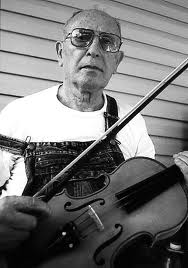Biography:Clyde Davenport
Clyde Davenport
| |
|---|---|
| Given name: | Clyde |
| Middle name: | |
| Family name: | Davenport |
| Place of birth: | Blue Hole Hollow, near Mt. Pisgah, Cumberland Plateau, central Kentucky |
| Place of death: | Monticello, Kentucky |
| Year of birth: | 1921 |
| Year of death: | |
| Profile: | Musician |
| Source of information: | |
Biographical notes
CLYDE DAVENPORT. Clyde Davenport (b. 1921) was born in Blue Hole Hollow, near Mt. Pisgah on the Cumberland Plateau in south-central Kentucky, not far from the border with Tennessee. His father was fiddle and banjo player Will Davenport, who was born in 1876, the son of Francis Marion Davenport who also was a fiddler. Clyde also had three brothers who played the fiddle. Many of the solo piece in Clyde's repertory were learned from his father, who in turn probably learned from Will Phipps, a frequent visitor to the family who used to bring his banjo to play with Francis Davenport. Phipps was considerably older than Francis, having been born in 1829. The Davenport family band (Clyde and his siblings) was in demand for dances when he was younger; Clyde played the banjo, his first instrument, while the brothers played fiddle. His 1992 National Heritage Fellowship announcement reads, in part:
At the age of 11 Clyde took the iron band off a small wagon wheel, trimmed out a green hickory hoop, bolted the ends together with a slat, and set it up to season. He paid a dime for a ground-hog hide, attached it to the frame with carpet tacks, carved out a long hickory neck, and he had his first banjo. In his mid-teens, he first heard the music of the widely-admired fiddle and banjo duo of Blind Dick Burnett and Leonard Rutherford, perhaps the greatest single musical influence of his life.
Clyde particularly admired Rutherford's smooth, long-bowing technique typical of the region. In his words: "It was just like it was greased. There wasn't a scratch or noise of no kind. Just clear as a bell...." His attraction to Rutherford's flawless technique lad him eventually to make the fiddle his instrument of choice.
In the opinion of Joe Wilson, director of the National Council for the Traditional Arts, “Clyde Davenport is now the great exemplar of the Cumberland style, and some local players think he is the best ever. That is a considerable compliment in a place where memory is long and carried in families, and where fiddlers who have been deceased for most of this century are often discussed and players know which tunes and techniques came down from them.”[1]
